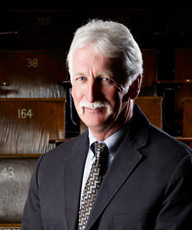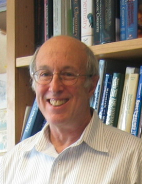Related Research Articles

Peter B. Moore is Sterling Professor emeritus of Chemistry, Professor of Molecular Biophysics and Biochemistry at Yale University. He has dedicated his entire career to understanding the structure, function, and mechanism of the ribosome.
Craig Jon Hawker is an Australian-born chemist. His research has focused on the interface between organic and polymer chemistry, with emphasis on the design, synthesis, and application of well-defined macromolecular structures in biotechnology, microelectronics, and surface science. Hawker holds more than 45 U.S. patents, and he has co-authored over 300 papers in the areas of nanotechnology, materials science, and chemistry. He was listed as one of the top 100 most cited chemists worldwide over the decade 1992–2002, and again in 2000–2010.

Kendall Newcomb Houk is a Distinguished Research Professor in Organic Chemistry at the University of California, Los Angeles. His research group studies organic, organometallic, and biological reactions using the tools of computational chemistry. This work involves quantum mechanical calculations, often with density functional theory, and molecular dynamics, either quantum dynamics for small systems or force fields such as AMBER, for solution and protein simulations.

Sir David William Cross MacMillan is a Scottish chemist and the James S. McDonnell Distinguished University Professor of Chemistry at Princeton University, where he was also the chair of the Department of Chemistry from 2010 to 2015. He shared the 2021 Nobel Prize in Chemistry with Benjamin List "for the development of asymmetric organocatalysis". MacMillan used his share of the $1.14 million prize to establish the May and Billy MacMillan Foundation.

William L. Jorgensen is a Sterling Professor of Chemistry at Yale University. He is considered a pioneer in the field of computational chemistry. Some of his contributions include the TIP3P, TIP4P, and TIP5P water models, the OPLS force field, and his work on free-energy perturbation theory for modeling reactions in solution, protein-ligand binding, and drug design; he has over 450 publications in the field. Jorgensen was the Editor of the ACS Journal of Chemical Theory and Computation from its founding in 2005 until 2022.

Ralph G. Nuzzo is an American chemist and professor. Nuzzo is a researcher in the chemistry of materials, including processes that occur at surfaces and interfaces. His work has led to new techniques for fabricating and manipulating materials at the nano scale level, including functional device structures for microelectronics, optics and chemical sensing.

Chad Alexander Mirkin is an American chemist. He is the George B. Rathmann professor of chemistry, professor of medicine, professor of materials science and engineering, professor of biomedical engineering, and professor of chemical and biological engineering, and director of the International Institute for Nanotechnology and Center for Nanofabrication and Molecular Self-Assembly at Northwestern University.

Peter John Stang is an American chemist and Distinguished Professor of chemistry at the University of Utah. He was the editor-in-chief of the Journal of the American Chemical Society from 2002 to 2020.
Laura Lee Kiessling is an American chemist and the Novartis Professor of Chemistry at the Massachusetts Institute of Technology. Kiessling's research focuses on elucidating and exploiting interactions on the cell surface, especially those mediated by proteins binding to carbohydrates. Multivalent protein-carbohydrate interactions play roles in cell-cell recognition and signal transduction. Understanding and manipulating these interactions provides tools to study biological processes and design therapeutic treatments. Kiessling's interdisciplinary research combines organic synthesis, polymer chemistry, structural biology, and molecular and cell biology.

David E. Cane is an American biological chemist. He is Vernon K. Krieble Professor of Chemistry Emeritus and professor of molecular biology, cell biology, and biochemistry emeritus at Brown University in Providence, Rhode Island. He is recognized for his work on the biosynthesis of natural products, particularly terpenoids and polyketides. He was elected as a Fellow of the American Association for the Advancement of Science in 2003 and as a Fellow of the American Academy of Arts and Sciences in 2013.
Melanie Sarah Sanford is an American chemist, currently the Moses Gomberg Distinguished University Professor of Chemistry and Arthur F. Thurnau Professor of Chemistry at the University of Michigan. She is a Fellow for the American Association for the Advancement of Science, and was elected a member of the National Academy of Sciences and the American Academy of Arts and Sciences in 2016. She has served as an executive editor of the Journal of the American Chemical Society since 2021, having been an associate editor of the since 2014.
Timothy P. Lodge is an American polymer scientist.

Marston Taylor Bogert was an American chemist.

Scott Eric Denmark is an American chemist who is the Reynold C. Fuson Professor of Chemistry at the University of Illinois at Urbana-Champaign (UIUC). Denmark received an S.B. degree from MIT in 1975 and the D.Sc.Tech. degree from ETH Zurich in 1980, under the supervision of Professor Albert Eschenmoser. He joined the faculty at UIUC the same year and became an associate professor in 1986, full professor in 1987, and was named the Fuson Professor of Chemistry in 1991. He served as the president and editor-in-chief of the Organic Reactions book series between 2008 and 2018. In 2017, Denmark was elected to the American Academy of Arts and Sciences. In 2018, he was elected to the National Academy of Sciences.
Stephen L. Buchwald is an American chemist and the Camille Dreyfus Professor of Chemistry at MIT. He is known for his involvement in the development of the Buchwald-Hartwig amination and the discovery of the dialkylbiaryl phosphine ligand family for promoting this reaction and related transformations. He was elected as a fellow of the American Academy of Arts and Sciences and as a member of the National Academy of Sciences in 2000 and 2008, respectively.

Diane Grob Schmidt is an American chemist, who was the executive at Procter & Gamble Co. in Cincinnati, Ohio, from 1981 to 2014. In 2015, she served as president of the American Chemical Society (ACS). As of 2022, she was serving as the chair of the board of visitors for the department of chemistry at the University of Tennessee, Knoxville.
Peter Wipf is a distinguished university professor of chemistry at the University of Pittsburgh. His research interests focus on the total synthesis of natural products, the discovery of new transformations of strained molecules, and the development of new pharmaceuticals. He is a Fellow of the Royal Society of Chemistry (RSC), the American Association for the Advancement of Science (AAAS), and the American Chemical Society (ACS).
Paul AnthonyWender is an American chemist whose work is focused on organic chemistry, organometallic chemistry, synthesis, catalysis, chemical biology, imaging, drug delivery, and molecular therapeutics. He is currently the Francis W. Bergstrom Professor of Chemistry at Stanford University and is an Elected Fellow at the American Association for the Advancement of Science and the American Academy of Arts and Sciences.
Jeanne Ellen Pemberton is an American analytical chemist and Regents' Professor at the University of Arizona. Her research involves surface science and developing applications for glycolipids. In 1997, she was cofounder of the Committee on the Advancement of Women Chemists (COACh). She is an elected Fellow for several scientific societies, including the American Chemical Society and American Association for the Advancement of Science. She has leadership roles with the academic journals Annual Review of Analytical Chemistry and Analytical Chemistry.
Marisa C. Kozlowski is an American chemist who is Professor of Organic and Catalysis Chemistry at the University of Pennsylvania. Her research considers asymmetric synthesis and the development of cost effective catalysts. She was elected Fellow of the American Association for the Advancement of Science in 2012 and American Chemical Society in 2013.
References
- 1 2 3 "Editor-in-Chief". The Journal of Organic Chemistry. ACS Publications . Retrieved September 7, 2024.
- ↑ "AAAS Members Elected as Fellows". AAAS News. American Association for the Advancement of Science. December 23, 2011. Retrieved September 8, 2024.
- 1 2 "Scott J. Miller". Member Directory. American Academy of Arts and Sciences. September 7, 2024. Retrieved September 8, 2024.
- ↑ "Scott J. Miller". Member Directory. National Academy of Sciences . Retrieved September 8, 2024.
- 1 2 "Scott Miller named Sterling Professor of Chemistry". YaleNews. Yale University. February 9, 2024. Retrieved September 8, 2024. (Department of Chemistry)
- 1 2 "Scott J. Miller". The Miller Group. Yale University . Retrieved September 8, 2024.
- ↑ "Scott Miller". Department of Chemistry. Yale University . Retrieved September 8, 2024.
- ↑ "Elected Fellows". AAAS Fellows. American Association for the Advancement of Science . Retrieved September 8, 2024.
- ↑ Wang, Linda (August 22, 2016) [August 5]. "Scott Miller to lead the Journal of Organic Chemistry". C&EN Global Enterprise . 94 (33): 55. doi: 10.1021/cen-09433-acsnews002 .
- ↑ Stanchak, Jesse (February 22, 2017). "Get to Know the Journal of Organic Chemistry Editor-in-Chief Scott J. Miller". ACS Axial Chemistry Blog. ACS Publications . Retrieved September 8, 2024.
- ↑ Paradis, Charlyn (May 25, 2022). "Scott J. Miller Inducted into National Academy of Sciences". Department of Chemistry. Yale University . Retrieved September 8, 2024.
- ↑ "Celebrating FAS faculty achievements". Faculty of Arts and Sciences. Yale University. March 28, 2024. Retrieved September 8, 2024.